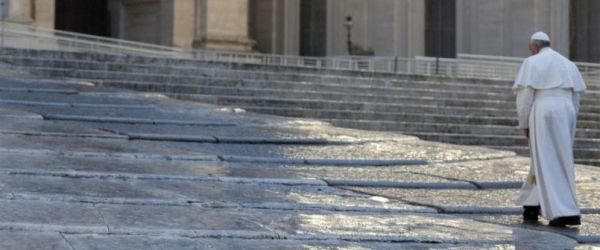"Lord if thou wilt, thou canst". It is a simple prayer, "an act of trust" and at the same time "a real challenge", that which the leper addresses to Jesus to heal him. A plea that comes from the depths of his heart and that tells, at the same time, of the Lord's way of acting, under the banner of compassion, "of suffering with and for us", of "taking the suffering of the other person upon himself" to soothe and heal it in the name of the Father's love. Pope Francis, in his homily at the Mass at Casa Santa Marta [...] dwelt on the Gospel episode of the healing of the leper, and urged us to look to the compassion of Jesus, who came to give his life for us sinners.
The Pope emphasised the 'simple story' of the leper who asks Jesus for healing. In that 'if you want' there is the prayer that 'draws God's attention' and there is the solution. "It is a challenge," Francis said, "but it is also an act of trust. I know that He can and that is why I entrust myself to Him."
"But why," the Pontiff wondered, "did this man feel inside to make this prayer? Because he saw how Jesus acted. This man had seen the compassion of Jesus". "Compassion", not punishment, is a "refrain in the Gospel" that has the faces of the widow of Nain, the Good Samaritan, the father of the prodigal son: "Compassion involves, it comes from the heart and involves and leads you to do something. Compassion is to suffer with, to take the other's suffering upon yourself in order to resolve it, to heal it. And this was Jesus' mission. Jesus did not come to preach the law and then leave. Jesus came in compassion, that is, to suffer with and for us and to give his own life. So great is Jesus' love that compassion led him to the cross, to giving his life".
The Pope's invitation is to repeat "this little phrase": "He had compassion". Jesus,' Francis explained, 'is able to involve himself in the pain, in the problems of others because he came for this, not to wash his hands and give three, four sermons and leave', he is always with us. "Lord if you want you can heal me; if you want you can forgive me; if you want you can help me". Or if you want a bit longer: "Lord, I am a sinner, have mercy on me, have compassion on me". Simple prayer, which can be said many times a day. "Lord, I am a sinner, I ask you: have mercy on me". Many times a day, from the heart inwardly, without saying it out loud: "Lord if you want, you can. Have mercy on me'. Repeat this".
The leper, with his simple and miraculous prayer, was able to obtain healing through the compassion of Jesus, who loves us even in sin: "He is not ashamed of us. "O Father, I am a sinner, how shall I go about saying this...". Better! For He came precisely for us sinners, and the greater sinner you are, the closer the Lord is to you, for He came for you, the greatest sinner, for me, the greatest sinner, for all of us. We make a habit of repeating this prayer, always: 'Lord, if you will, you can. If you wish, you can', with the confidence that the Lord is close to us and his compassion will take upon himself our problems, our sins, our inner sicknesses, everything".
[Pope Francis, homily at St. Martha's; in L'Osservatore Romano, 17.01.20]












